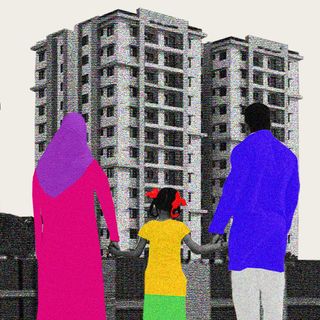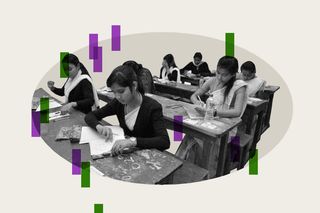
Assam Govt Is Suspending Internet Services to Prevent Cheating in Exams
Courts have previously warned against internet suspension on the grounds of examination, calling shutdowns “disproportionate and unjustified.”

The Assam government is temporarily imposing a mobile internet shutdown across 24 districts as an anti-cheating measure for examinations. Two entrance exams — one conducted yesterday and one to be held next Sunday, August 28th — are part of the biggest recruitment drive in the state for sundry government positions. And the internet suspension was imperative “in the interest of holding free, fair, and transparent” exams, the government order stated.
While social media and other digital corridors have in the past allowed for malpractices, the internet suspension citing examinations as a reason dangerously incorporates internet blockades into mainstream government use. It not only raises questions about “digital disciplining” as an anti-cheating measure, but also renews concerns about the rise of arbitrary internet shutdowns in India that are invoked without due process. When imposed with increasing frequency and with questionable intent, shutdowns have a deleterious impact on free speech and access to information.
Almost 14 lakh candidates will be appearing for these exams that are scheduled for August 21st, 28th, and September 11th. The decision involves the Indian Telegraph Act, section 5(2) of which allows for temporary suspension of mobile internet for public safety or during public emergency. This effectively means that for four hours on two days, people in Assam would not be able to access mobile data services.
Government officials have justified the necessity of internet suspensions to prevent cheating. In the past, “unscrupulous elements resorted to unfair means using different mobile applications such as Facebook, WhatsApp, Twitter, YouTube, etc. which are based on internet connectivity,” the order noted. Question papers leaked on WhatsApp have the potential to cause “chaos.”
This incident is not unique. State governments like West Bengal have previously dealt with cheating and unfair means in recruitment examinations by way of installing internet jammers or CCTV cameras on the premises. Even this year the West Bengal governmentis contemplating suspending internet services to prevent cheating during its Madhyamik (class 10) exams. Earlier this year, the Rajasthan government also suspended mobile internet and texting services during the state’s teacher recruitment exams, the Rajasthan Eligibility Examination for Teachers (the exam papers were leaked and sold online for more than Rs. 1 crore).
Some restrictions transcendthe digital space; in Karnataka, students were asked to wear cardboard boxes over their heads, with one left for open visibility during a school examination. The National Eligibility Entrance Test in Kerala has a sexist history of asking candidates to remove their undergarments.
Cheating is unfair and warrants action. But the Assam government imposing internet shutdowns under the abstract cause of “public safety” misses the point of how internet restrictions are forms of surveillance, violating people’s privacy and autonomy. Moreover, it allows for a culture of normalizingintrusive disciplining.
Related on The Swaddle:
Indian Economy Lost Rs. 20,000 Crores Due to Government’s Internet Bans in 2020
“… a confluence of extreme competitiveness, resource scarcity in education, and the convergence of exam performance with self-identity have all led to a situation where examiners stop at nothing to prevent ‘cheating,'” as Rohitha Naraharisetty wrote in The Swaddle. “In other words, there are so few opportunities for good education available and so many people competing for them that the public examination system pits young people against one another, gladiator-style, to fight for their right to receive quality education.” The response to internet shutdowns is then presumed to besubmissive, where people are expected to see it as a necessity to curb the malaise of frauds and scams. But never is therefurtherintrospective questioning on what makes the competition so prone to “unscrupulous elements” in the first place.
Even before it happened in Assam, internet shutdowns on the grounds of conducting exams have previously been held to be “disproportionate and unjustified” by Indian courts too. The Calcutta High Court in March said the order to suspend mobile internet to prevent cheating “lacks proper reasoning.” The order also did not “provide reasons that establish that alternative measures were unavailable or unsuitable and thus did not satisfy the test of proportionality.”
Referring to the present incident, politician Pradyut Bordoloi also wrote to the Assam government, noting that “the disproportionate nature of this measure has an impact on right to speech, right to livelihood, access to information, education, and health.”
India has notoriously earned the reputation of being the “internet shutdown capital of the world.” In 2020, our shutdown orders accounted for over 70% of the world’s, with many imposed to curb communal tension and protests (shutdowns also led to an economic loss of Rs. 20,000 crores). Internet shutdowns are an “often-used tool the government relies upon to silence dissent and limit the rights to freedom of press and expression under the guise of maintaining law and order,” a report authored by the Centre for Human Rights of the American Bar Association noted.
India’s use of internet suspensions is also worrying for the lack of centralized records detailing the efficacy and scope of such restrictions. There is no data, survey, or expert undertaking to analyze how much — or how little — these suspensions actually serve the cause of “public emergency” or “safety.” Moreover, many of these suspensions violate the Supreme Court directive passed in 2020. Based on a response to Kashmir Times editor Anuradha Bhasin’s petition, the court mandated Union and state governments to publish internet shutdown orders on official government websites before they imposed it and to retain the orders on their websites. These guidelines have been violated on several occasions. The Internet Freedom Foundation (IFF) also found that internet shutdown orders in response to Rajasthan’s REET “also refer to ‘anti-social elements’ spreading misinformation on the internet.”
“The harm caused by these internet shutdowns outweigh any speculative benefit,” IFF noted. “To suspend internet services on a vague, tenuous, and unsubstantiated apprehension that the protest or an exam ‘may adversely affect the public safety and law and order situation’ is to violate the constitutional rights of the residents of the affected districts. A vague apprehension of a law and order problem does not satisfy the legal threshold of a public emergency or a threat to public safety.”
Saumya Kalia is an Associate Editor at The Swaddle. Her journalism and writing explore issues of social justice, digital sub-cultures, media ecosystem, literature, and memory as they cut across socio-cultural periods. You can reach her at @Saumya_Kalia.
Related


How the Law’s Fixation on Women’s ‘Modesty’ Upholds Rape Culture
